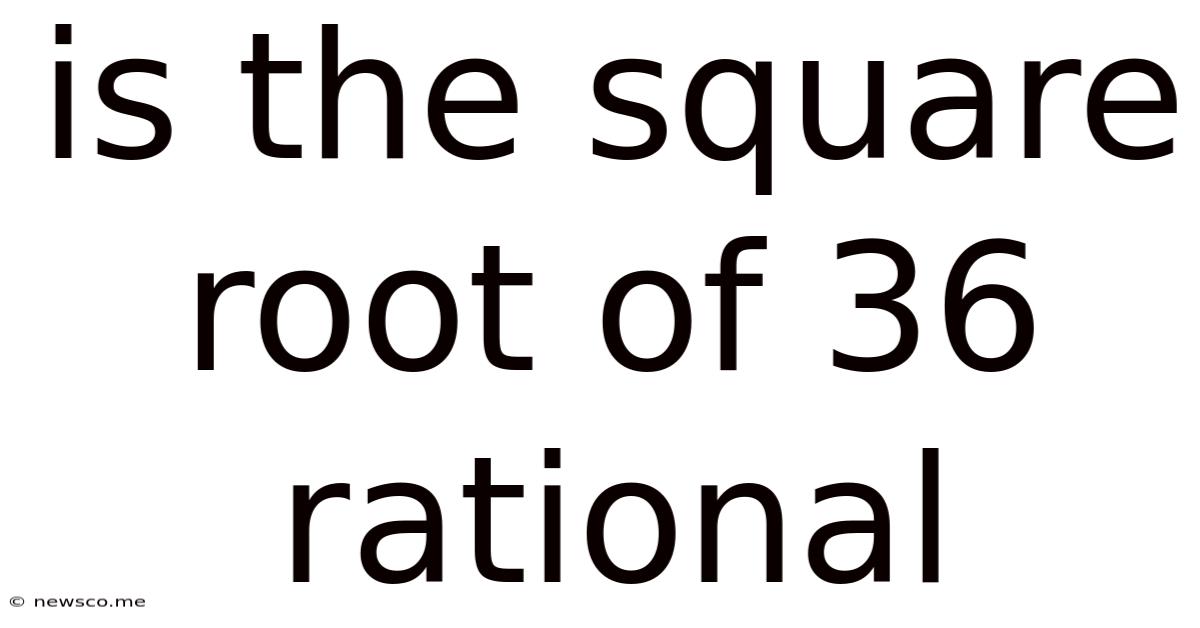Is The Square Root Of 36 Rational
News Co
May 08, 2025 · 4 min read

Table of Contents
Is the Square Root of 36 Rational? A Deep Dive into Number Theory
The question, "Is the square root of 36 rational?" might seem deceptively simple. However, exploring this seemingly straightforward query opens the door to a fascinating exploration of fundamental concepts in number theory, including rational and irrational numbers, perfect squares, and the properties of real numbers. This article will not only answer the question definitively but will also provide a comprehensive understanding of the underlying mathematical principles involved.
Understanding Rational and Irrational Numbers
Before diving into the specifics of the square root of 36, let's solidify our understanding of rational and irrational numbers. This forms the bedrock of our analysis.
Rational Numbers: The Realm of Fractions
A rational number is any number that can be expressed as a fraction p/q, where p and q are integers, and q is not equal to zero. This seemingly simple definition encompasses a vast range of numbers. For example:
- Integers: All whole numbers (positive, negative, and zero) are rational. For example, 5 can be written as 5/1.
- Fractions: Obvious examples include 1/2, 3/4, and -7/8.
- Terminating Decimals: Decimals that end after a finite number of digits are also rational. For instance, 0.75 is equivalent to 3/4.
- Repeating Decimals: Decimals with a repeating pattern, like 0.333... (1/3) or 0.142857142857... (1/7), are rational. They can always be expressed as a fraction.
Irrational Numbers: Beyond the Fraction
Irrational numbers, on the other hand, cannot be expressed as a fraction of two integers. Their decimal representations are non-terminating and non-repeating, meaning they go on forever without ever settling into a predictable pattern. Famous examples include:
- π (Pi): The ratio of a circle's circumference to its diameter, approximately 3.14159...
- e (Euler's number): The base of the natural logarithm, approximately 2.71828...
- √2 (Square root of 2): This number, approximately 1.41421..., cannot be expressed as a fraction. Its irrationality is a classic proof in number theory.
The Square Root: Unveiling the Mystery of 36
The square root of a number is a value that, when multiplied by itself, equals the original number. In simpler terms, it's the inverse operation of squaring a number. For example:
- √9 = 3 because 3 x 3 = 9
- √16 = 4 because 4 x 4 = 16
Now, let's tackle the central question: Is the square root of 36 rational?
Solving the Equation: √36
The square root of 36 is 6, because 6 multiplied by itself (6 x 6) equals 36. The question now becomes: can 6 be expressed as a fraction p/q where p and q are integers and q ≠ 0?
The answer is a resounding yes. 6 can be easily expressed as 6/1. Since both 6 and 1 are integers, and 1 is not zero, the square root of 36 perfectly fits the definition of a rational number.
Proof and Further Exploration
The rationality of √36 is straightforward, but let's delve deeper into the mathematical reasoning behind it. We can demonstrate this using a formal proof:
Theorem: √36 is a rational number.
Proof:
- Definition: √36 is defined as the number x such that x * x = 36.
- Solution: We know that x = 6 satisfies this equation (6 * 6 = 36).
- Rational Form: The number 6 can be expressed as the fraction 6/1, where both 6 and 1 are integers, and 1 is not equal to zero.
- Conclusion: Since 6 satisfies the definition of a rational number, √36 is rational.
This proof highlights the simple yet powerful connection between perfect squares and rational numbers. Any perfect square (a number that results from squaring an integer) will always have a rational square root. This is because the square root will always be an integer, and integers are, by definition, rational numbers.
Expanding the Concept: Perfect Squares and Rational Roots
The relationship between perfect squares and rational square roots extends far beyond the simple example of 36. Consider the following:
- √4 = 2 (rational: 2/1)
- √25 = 5 (rational: 5/1)
- √100 = 10 (rational: 10/1)
- √144 = 12 (rational: 12/1)
Every perfect square will yield an integer square root, which is always expressible as a rational number.
Contrasting with Irrational Square Roots
The situation is drastically different when we consider non-perfect squares. For example:
- √2 ≈ 1.41421... (irrational)
- √3 ≈ 1.73205... (irrational)
- √5 ≈ 2.23607... (irrational)
The square roots of these numbers are irrational because their decimal expansions are non-terminating and non-repeating. They cannot be expressed as a fraction of two integers.
Conclusion: A Simple Question, Deep Insights
The question, "Is the square root of 36 rational?" might have seemed trivial at first glance. However, exploring this question allowed us to revisit and reinforce our understanding of rational and irrational numbers, delve into the concept of square roots, and appreciate the elegant connection between perfect squares and rational numbers. This journey underscores the importance of building a strong foundation in fundamental mathematical concepts. By understanding the core principles involved, we can confidently tackle more complex problems in number theory and related fields. This seemingly simple example provides a perfect springboard for exploring the rich and fascinating world of mathematics.
Latest Posts
Related Post
Thank you for visiting our website which covers about Is The Square Root Of 36 Rational . We hope the information provided has been useful to you. Feel free to contact us if you have any questions or need further assistance. See you next time and don't miss to bookmark.